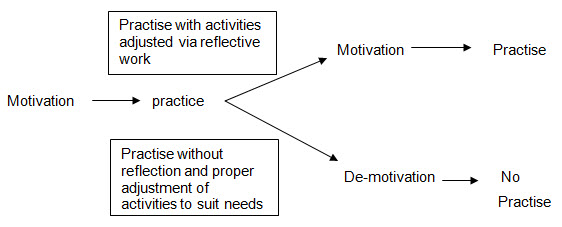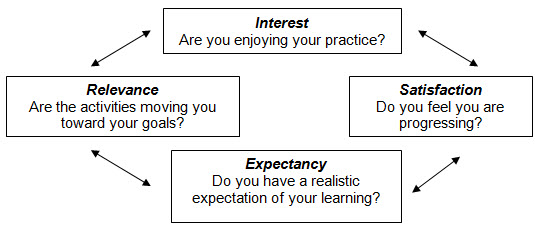Pleasure in the job puts perfection in the work. – Aristotle
 Guest Author Lisa Brown talks to us about Practing Music and Motivation
Guest Author Lisa Brown talks to us about Practing Music and Motivation
Motivation is the fuel, the energy if you like, vital for all learning to take place and just like fuel, there are different qualities of motivation. If yours is of a higher quality, your chances of success will be greatly improved because you will be able to last the journey.
So it’s always a good idea to check and reflect upon your motivation levels.

Two Main Types of Motivation.
They are extrinsic and intrinsic.
Extrinsic motivation is based on aspects outside you. For example, you want to learn an instrument to get good exam results, win awards, be praised or seek fame and fortune.
Intrinsic motivation comes from within. For example, you want to learn an instrument because you enjoy the challenge, love the sound, because it’s fun and relaxing for you etc.
Of these two types of motivation, intrinsic, is the most powerful, it is the higher-grade fuel and the only type of motivation that guarantees you become the best musician you can possibly be. This is because the process of learning music is a lifetime pursuit and many times, the rewards come simply from your own sense of achievement.
So right now, look at your motivation and finish this sentence:
I want to learn to __________________ because ____________________.
Is your motivation intrinsic or extrinsic?
Just like the fuel gauge in your car, you need to be aware of your motivation levels at all times. Sometimes your level of motivation will be low and you will have to “top up”, sometimes you will be driving on a full tank without a care in the world.
However, if your tank is empty, learning will be difficult and you may be tempted to give up. Therefore, continual reflection, decision-making and goal-setting is essential for good practice. If you know a little about motivation theory, you will understand why.
Motivation theory has four major dimensions:

As you can see, each of the above aspects has some bearing on another, so only by looking at what is happening for you in all these areas can you work out how to adjust your practise to ensure it impacts well upon your motivation. Here is how you might go about this:
1) Interest – Are you enjoying your practice?
If not, why not?
Are your activities too hard or too easy? If they are, you will feel you are not getting anywhere and this will affect your satisfaction.
2) Satisfaction – Do you feel you are progressing?
Sometimes you may not feel much progress, even if you are working consistently and well. This has to do with expectancy. Only with time and experience will you be able to know how long it takes and how much effort is required to learn certain aspects of music and, therefore, gain a realistic expectation of your development.
By reflecting upon your feelings of achievement and discussing these with your teacher, you will be able to gain a clearer insight of what is actually happening for you and be satisfied with the results of your work.
3) Expectancy – Do you have a realistic expectation of your learning?
Learning takes as long as it takes and you cannot rush it (just like growing). You must be patient with your development and keep practicing each activity until you master it.
If you are not sure what this means, ask yourself “Is this activity as easy as, for example, using a fork, opening a door or walking?” If you can answer ‘yes’, you have mastered it.
Sometimes mastering something can take many years which is why your motivation needs to be intrinsic – you have to be able to enjoy the slow development of certain skills and be aware of their relevance.
If you are trying to master something which is taking a while, it is ok to leave it and come back to it later.
4) Relevance – Are the activities moving you toward your goals?
Do you know why and how the activities you practise relate to achieving your goals? If you do not, you may feel your practise pointless, which affects your interest.
Ask your teacher to help apply what you are practicing to a piece you are learning, try to realise the practical outcomes of your work through creative activities such as improvisation, play-along and aural work.
It is always a good idea to check your motivation via these four aspects in order to find out if you are running on healthy energy. If you move through these questions and tweak your practice routine to suit, you will be more engaged in your learning and practise.
About the Author
